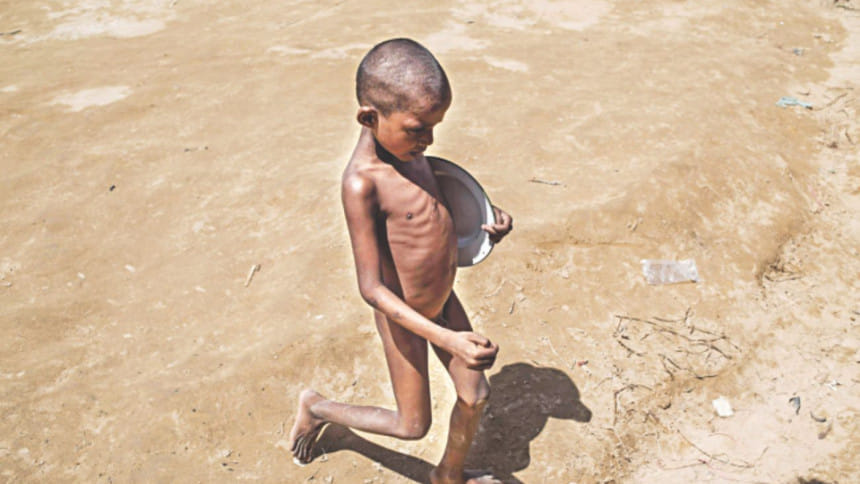Children hit hard by malnutrition

An estimated 7,500 Rohingya children in the squalid camps in Cox's Bazar are suffering from severe acute malnutrition, said Unicef as it launched yesterday a $76.1 million appeal for its emergency humanitarian response to the Rohingya crisis.
The Unicef said its appeal would cover the immediate needs of 720,000 children -- those who arrived newly as well as those who arrived before the recent influx, and children from vulnerable host communities in Cox's Bazar.
Up to 60 percent of the over 500,000-plus Rohingyas who have fled Myanmar since August 25 are estimated to be children. Most are now living in harsh and insanitary conditions in makeshift camps and settlements spread across the district.
Quoting the United Nations, AFP reported more than 14,100 children are at risk of dying from malnutrition at the Rohingya camps.
"Desperate, traumatised children and their families are fleeing the violence in Myanmar every day.... These children are being denied a childhood. They need our help now and they need our help to have a future," said Unicef Executive Director Anthony Lake, who is visiting the southern Bangladesh.
"We are scaling up our response as fast as we can, but the magnitude of need is immense and we must be able do more to help them," he said.
Expanding the provision of safe water, sanitation and improved hygiene for Rohingya children is the overriding priority of the appeal amid concerns over a possible outbreak of diarrhoea and other waterborne diseases, Unicef said.
The majority of Rohingya children are not fully immunised against diseases such as polio. An oral cholera vaccination campaign targeting all children over 1 year is planned in October, and 900,000 doses of the vaccine are expected to arrive in Bangladesh by October 7.
An earlier Unicef appeal for $7 million has been expanded to reflect the fast-growing scale of the crisis.
The World Food Program (WFP), meanwhile, appealed for $75 million in emergency aid to help reduce the suffering of Rohingyas over the next six months.
"I have heard heart-breaking stories today, speaking to people who ran for their lives and saw loved ones being killed before their eyes. These horrors must stop," WFP Executive Director David Beasley said after visiting Rohingya camps in Cox's Bazar.
Noting that many of those people were receiving WFP food assistance in Myanmar, he stressed that they would continue to get that in Bangladesh as well until they are able to return home safely.
"I say we can end world hunger with a few billion dollars. I tell donors, if you can't give us the money, stop the wars," added Beasley.
UN OFFICIALS TAKEN TO RAKHINE
AP reported Myanmar authorities yesterday took three groups of foreign diplomats and UN representatives on a tour of the conflict-torn Rakhine State.
Ye Htut, district administrator of Maungdaw in Rakhine, said this, but did not provide details on the diplomats' nationalities.
Myanmar has come under international criticism for barring aid groups, journalists and other outsiders from independently travelling to the region to see the situation there. A previous guided visit for diplomats scheduled for last week was abruptly cancelled.
Local officials in Rakhine told AP yesterday's tour includes meetings with relatives of victims allegedly killed by militants during the violence against Hindu, Mro and Daignets minority communities in Maungdaw township.
In the morning, the diplomats were taken to Anaut Pyin village of Rathedaung township, a community of Rohingyas who have not fled, said local police officer Moe Zaw.
SWITZERLAND FOR POLITICAL, LONG-TERM SOLUTION
Delegate of the Swiss Government for Humanitarian Aid and deputy director general of Swiss Agency for Development and Cooperation (SDC) Ambassador Manuel Bessler expressed deep concern over the humanitarian crisis, saying "the challenges in Rohingya camps are unprecedented."
"Therefore, it is very important to devise a well-coordinated response by all actors and extend their support to all those in need, including the local communities," he said while visiting a Rohingya settlement of new arrivals in Palangkhali, says a statement of Swiss embassy in Dhaka.
It says Switzerland encourages national, regional and international efforts towards a political solution to the Rohingya refugee crisis and stands ready to offer its good services for a long term solution to the crisis in Rakhine.
Switzerland has committed to contribute 1.8 million Swiss Francs (approximately BDT 150.5 million) in emergency humanitarian assistance for the Rohingya arrivals through the Humanitarian Aid Unit of SDC.
A Swiss foundation named Swiss Solidarity has initiated a collection call to raise money to help the displaced Rohingyas. It is expected that several million Swiss francs will be collected amongst Swiss population, the statement says.

 For all latest news, follow The Daily Star's Google News channel.
For all latest news, follow The Daily Star's Google News channel. 








Comments